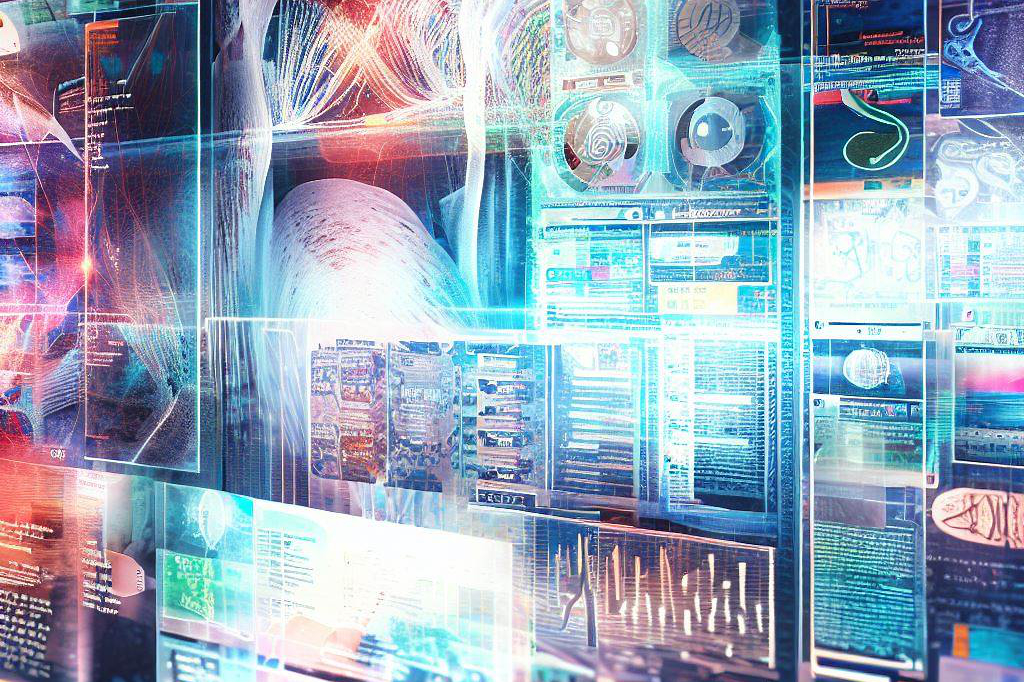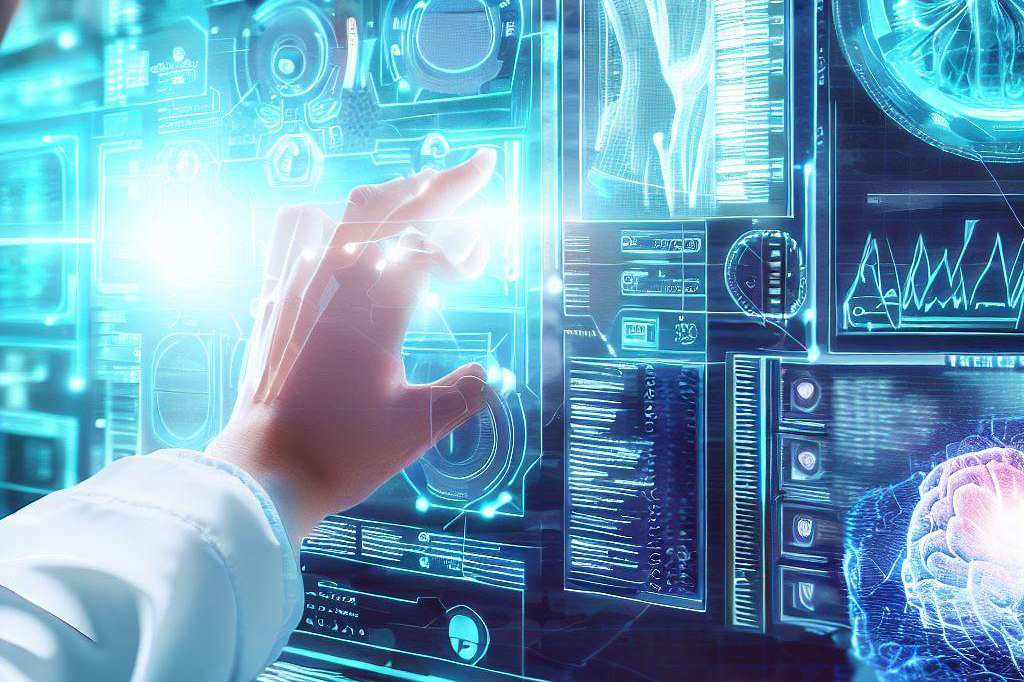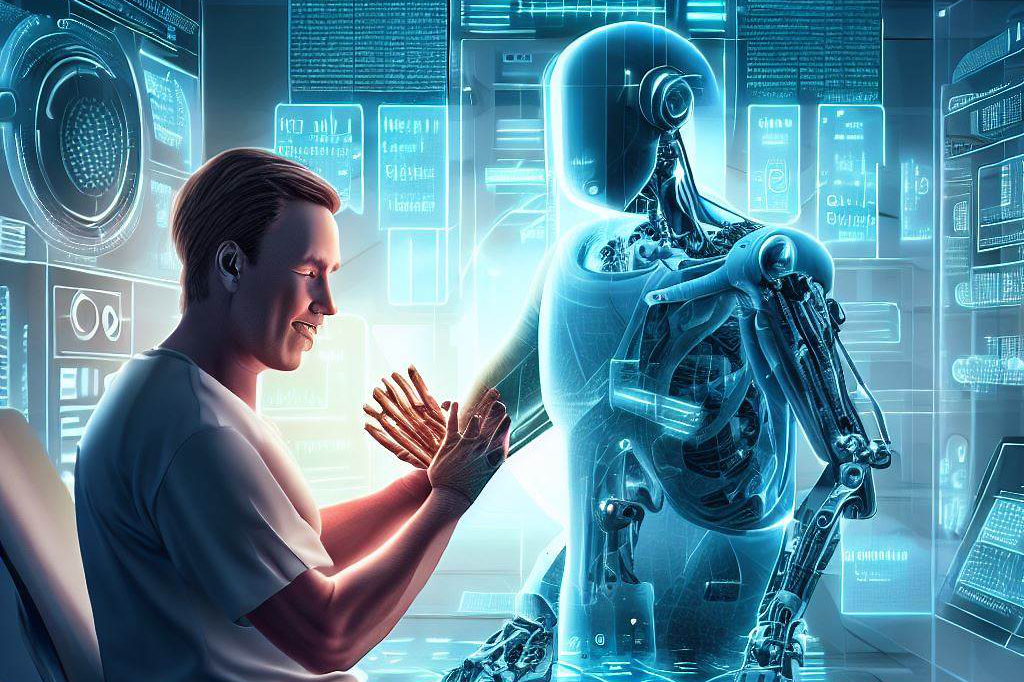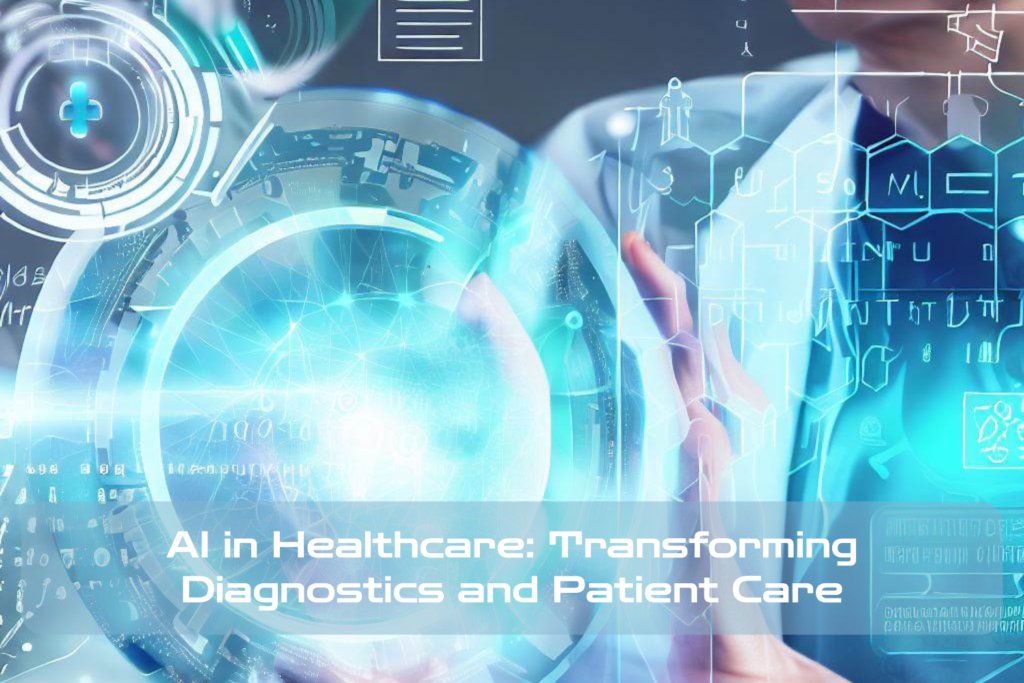The Rise of AI in Healthcare
Artificial intelligence (AI) is rapidly transforming the healthcare industry. By using complex algorithms and cutting-edge technology, AI has the potential to revolutionize diagnostics and patient care.
In essence, AI can be defined as a branch of computer science that deals with the creation of intelligent machines that can perform tasks that typically require human intelligence. In healthcare settings, these machines can analyze large sets of data to identify patterns, diagnose illnesses, and even develop personalized treatment plans for patients.
The potential impact of AI on healthcare cannot be understated. With an aging population and growing demand for medical services worldwide, AI could provide much-needed assistance in diagnosing diseases quickly and accurately, reducing healthcare costs, and enhancing patient outcomes.
The Importance of AI in Healthcare

The importance of AI in healthcare lies in its ability to process massive amounts of data quickly while simultaneously improving accuracy. Traditional methods for diagnosis or treatment planning can take hours or even days to complete.
With AI technology assisting medical professionals, diagnoses can be made much more efficiently and with greater accuracy. Furthermore, this technology enables doctors to personalize care for their patients based on individual needs rather than relying on more generalized treatment plans.
AI also has enormous potential to improve diagnostic testing by utilizing advanced image recognition software or natural language processing capabilities, which allow computers to understand spoken or written information like humans do.
In addition, remote monitoring devices connected via the Internet of Things (IoT) paired with intelligent algorithms are providing physicians with real-time feedback on patient conditions, thereby enhancing earlier interventions or preventative solutions.
Overview of the Impact of AI on Diagnostics and Patient Care

The impact of AI on diagnostics has already been transformative; imagine being able to detect cancers from MRI scans faster than an experienced radiologist would?
This is made possible by deep learning algorithms that can process and analyze complex data sets rapidly.
The potential impact of AI on patient care is just as significant.
Paired with predictive analytics, AI can help identify patients at risk for chronic diseases like diabetes or heart disease early on, enabling physicians to intervene early and prevent the onset of these conditions.
AI can also provide patients in remote or rural areas with access to healthcare through telemedicine solutions.
This technology allows doctors to remotely monitor patients, prescribe medications, and even provide virtual consultations – all from the comfort of a patient’s own home.
AI has immense value in healthcare.
It is helping medical professionals make faster and more accurate diagnoses while improving treatment outcomes for their patients. The technology also provides opportunities for remote monitoring solutions and personalized care plans that enhance quality of life for individuals worldwide.
The Role of AI in Diagnostics

Machine Learning Algorithms for Disease Detection
The use of machine learning algorithms in healthcare has revolutionized disease detection. With the help of AI, physicians can quickly and accurately diagnose diseases that would have been difficult or impossible to detect through traditional methods.
Machine learning algorithms can analyze vast amounts of data and use this information to identify patterns that can be used to diagnose a wide range of health conditions. One example is the use of machine learning algorithms for detecting breast cancer.
Researchers have developed a deep learning algorithm that can analyze mammograms and detect breast cancer with an accuracy rate comparable to that of human radiologists. In fact, the algorithm was even able to identify cancers that were missed by human radiologists.
Image Recognition Technology for Medical Imaging
AI-powered image recognition technology is another tool that is transforming diagnostics in healthcare. By analyzing medical images using advanced computer vision techniques, AI systems can quickly and accurately identify abnormalities or changes in tissues that may indicate disease. One example is the use of AI to identify lung cancer from CT scans.
Researchers have developed an image recognition algorithm that analyzes CT scans and identifies areas of abnormality that may indicate early-stage lung cancer. This technology has the potential to increase the accuracy of early-stage cancer diagnoses while reducing false positives.
Natural Language Processing for Clinical Documentation
Natural language processing (NLP) is another area where AI is having a major impact on diagnostics. By using NLP techniques, physicians can easily extract valuable information from clinical documentation, such as electronic health records (EHRs), without having to manually sift through large amounts of data. For instance, researchers have developed an NLP-based system known as BioMedEx that extracts detailed information from EHRs about patients’ medical histories, medications taken, procedures performed or ordered by clinicians, etc., allowing doctors access to rich information about patients in real time.
Case Studies on the Effectiveness of AI in Diagnostics
Many case studies have been conducted to determine the effectiveness of AI in diagnostics.
One notable example is Google’s DeepMind Health, which uses machine learning algorithms to analyze medical images and provide real-time feedback to radiologists. In a study published in Nature, researchers found that DeepMind’s system was able to detect breast cancer with an accuracy rate of 94.5%, compared with a human radiologist’s accuracy rate of 88.1%.
Another example is the use of AI for detecting diabetic retinopathy, a condition that can cause blindness if left untreated. In a study published in JAMA Ophthalmology, researchers found that an AI system was able to accurately identify signs of diabetic retinopathy from retinal images with an accuracy rate of 97%.
AI has immense potential to revolutionize disease detection through its ability to analyze vast amounts of data and identify patterns that may be difficult for humans to spot alone. As more research is conducted and new technologies are developed, we can expect AI-powered diagnostics systems to become even more effective at detecting diseases early on and providing more targeted treatments for patients.
The Impact of AI on Patient Care

Personalized Treatment Plans Based on Patient Data
One of the most significant impacts of AI in healthcare is its ability to create personalized treatment plans based on patient data. With the help of machine learning algorithms, healthcare providers can analyze large datasets to identify patterns and predict outcomes for individual patients.
This allows for tailored treatment plans that take into account each patient’s unique medical history, genetic makeup, and lifestyle factors. AI can also be used to monitor a patient’s response to treatment and adjust the plan accordingly.
For example, if a patient with diabetes is not responding well to a certain medication, an AI system can suggest alternative treatments based on similar cases. This level of personalization has the potential to improve patient outcomes while reducing costs by avoiding trial and error approaches to treatment.
Predictive Analytics for Early Detection and Prevention
AI can also be used for early detection and prevention through predictive analytics. By analyzing large amounts of data from electronic health records, wearables, and other sources, AI algorithms can identify patients at risk for certain conditions before any symptoms appear. For example, an AI system could detect changes in a person’s heart rate or blood pressure pattern that indicate they may be at risk for a heart attack.
The system could then alert the patient’s healthcare provider, who could intervene early with preventive measures such as lifestyle interventions or medication. This approach has the potential to significantly reduce healthcare costs by preventing expensive hospitalizations and emergency procedures.
Remote Monitoring and Telemedicine using AI Technology
Another way that AI is transforming patient care is through remote monitoring and telemedicine using AI technology. Patients in remote areas or with limited access to healthcare providers can now receive high-quality care through virtual consultations with doctors or nurses equipped with advanced AI tools. AI-powered devices such as wearable sensors or home monitoring systems can detect changes in a patient’s health status and alert healthcare providers before any serious complications arise.
This reduces the need for in-person visits and can also improve patient outcomes by increasing access to care. Case studies have shown that remote monitoring using AI technology can lead to improved patient satisfaction, reduced hospital readmissions, and lower healthcare costs.
Challenges and Risks Associated with AI in Healthcare

As with any new technology, the adoption of artificial intelligence in healthcare comes with its own set of challenges and risks. The potential benefits of using AI to improve diagnostics and patient care cannot be denied, but it is important to address the ethical, social, and legal implications associated with its implementation.
Ethical concerns around data privacy and security
One of the main ethical concerns associated with using AI in healthcare is data privacy and security. The use of patient data is essential for the development and training of machine learning algorithms that are used for disease detection, diagnosis, and personalized treatment plans. However, there are risks associated with sharing sensitive patient information such as medical history, genetic data, and lifestyle habits.
To mitigate these risks, healthcare providers must adhere to strict data protection laws such as HIPAA (Health Insurance Portability and Accountability Act) to ensure that patient information is not misused or disclosed without consent. Additionally, cybersecurity measures such as encryption techniques can be implemented to prevent data breaches that could compromise patient privacy.
Potential bias in machine learning algorithms
Another challenge associated with implementing AI in healthcare is the potential for bias in machine learning algorithms. These algorithms rely on large datasets to learn from past cases and make predictions based on patterns identified within the data. However, if these datasets are biased or incomplete due to under-representation of certain populations or conditions, it can lead to inaccurate predictions or diagnoses.
To combat this issue, researchers must ensure that their training datasets are diverse enough to represent a wide range of patients from different demographics. In addition, transparency around how machine learning algorithms make decisions can facilitate greater trust between providers and patients regarding their diagnosis or treatment plan.
Legal implications surrounding the use of autonomous systems in healthcare
The implementation of autonomous systems such as robotic surgery or AI-powered medical devices raises legal implications surrounding liability and accountability. In the event of a malfunction or error, who is responsible for the resulting harm to the patient? Is it the manufacturer of the device, the healthcare provider who implemented it, or both?
To address these concerns, regulations such as the FDA‘s premarket approval process have been put in place to ensure that these devices meet safety and efficacy standards before being used in clinical settings. Additionally, healthcare providers must be trained on how to use these autonomous systems properly to minimize any potential risks associated with their implementation.
While AI has great potential for transforming diagnostics and patient care within healthcare settings, there are several ethical, social, and legal challenges that must be addressed. With proper regulations and guidelines put in place to protect patient privacy and safety, as well as ensuring transparency and accountability around how machine learning algorithms make decisions, AI can be a valuable tool for improving healthcare outcomes.
The Future of AI in Healthcare: Emerging Trends and Innovations

As the healthcare industry continues to embrace AI, several emerging trends and innovations are redefining the landscape of diagnostics and patient care. These include:
1. Genomics: AI is revolutionizing the field of genomics by providing more accurate predictions for disease risks, enabling personalized treatments based on an individual’s genetic makeup.
This has far-reaching implications for preventative healthcare, as it empowers patients to take proactive measures for their health.
2. Robotics: The integration of robotics with AI technology is transforming surgical procedures by allowing for minimally invasive surgeries that reduce complications, decrease recovery time, and improve patient outcomes.
3. Virtual Assistants: With natural language processing capabilities, virtual assistants can help clinicians automate administrative tasks such as scheduling appointments, sending reminders, and updating medical records. This frees up time for healthcare professionals to focus on more complex tasks that require human expertise.
The Impact of AI on Healthcare Systems, Providers and Patients
AI has the potential to transform healthcare systems by improving efficiency in diagnosis and treatment while also reducing costs associated with traditional methods of care delivery. Some potential impacts include:
1. Improved Patient Outcomes: With access to vast amounts of data through machine learning algorithms, providers are better equipped to design personalized treatment plans that cater to each patient’s unique needs.
2. Enhanced Efficiency: The use of predictive analytics can help providers identify high-risk patients before they develop symptoms or require extensive interventions, resulting in cost savings for both patients and the healthcare system.
3. Increased Patient Engagement: Remote monitoring using wearable devices allows patients to track their health metrics at home, leading to better self-management thus increasing patient engagement.
Opportunities for Collaboration between Industry Leaders, Policymakers & Researchers
Realizing the full potential of AI in healthcare requires a collaborative approach that involves policymakers, industry leaders, researchers, and other stakeholders. Here are some potential opportunities for collaboration:
1. Data Sharing: Collaboration between health systems, researchers, and other stakeholders could facilitate data sharing and enable large-scale analysis to improve patient outcomes.
2. Standards Development: Policymakers can support the development of standards in AI technology for healthcare to ensure accuracy, reliability, and transparency.
3. Ethical Considerations: Industry leaders can work with policymakers and regulators to develop ethical guidelines that protect patient privacy and ensure the fair use of AI technology in healthcare.
AI has enormous potential to transform the landscape of healthcare by improving diagnostics and patient care while also reducing costs associated with traditional methods of care delivery.
However, realizing this potential requires a collaborative approach involving industry leaders, policymakers, researchers, clinicians, as well as patients. By working together towards common goals such as improving patient outcomes or developing ethical guidelines for the use of AI in healthcare will lead to a future where everyone benefits from these transformative technologies.
Final Thoughts
The Future of AI in Healthcare: Opportunities for Advancement
As we look to the future, there are several emerging trends and innovations within the field that hold promise for further advancement.
For instance, researchers are exploring ways to develop more accurate diagnostic tools using AI technology combined with genomic data.
Wearable devices that monitor health indicators such as heart rate variability, skin temperature changes, and respiratory rate could be used as part of a diagnostic toolset alongside other medical tests.
Machine learning algorithms can also be used more effectively to improve clinical decision-making processes, which will lead to better outcomes for patients with chronic diseases by predicting their disease progression or recovery time.
We believe that there is significant opportunity for collaboration between industry leaders, researchers, policymakers, and other stakeholders within the healthcare sector to develop new technologies that address these challenges while simultaneously advancing innovation within this space.
The Glass Half Full: Optimism in the Face of Challenges
While there are certainly challenges associated with implementing AI technology within healthcare settings – including ethical concerns surrounding data privacy or potential biases within machine learning algorithms – we believe that these challenges serve as opportunities for continued innovation and advancements in healthcare.
As policymakers, industry leaders, healthcare providers, and researchers come together to develop new technologies that address these challenges, we are confident that the future of AI in healthcare will be characterized by further progress and improvement. Ultimately, this can lead to greater access to quality care for all individuals while simultaneously improving outcomes for those suffering from a wide range of illnesses.

C M, a seasoned editor, journalist, and consultant, is deeply fascinated by the convergence of technology, space, and the future of humanity.
With a particular interest in transhumanism, futurology, and the philosophical and ethical dimensions of these domains, C M serves as the lead contributor to TranscendSphere and SpaceSpotlight.
When not penning insightful articles on these rapidly evolving fields, C M indulges in their love for podcasts and books, proudly embracing their status as a ‘Happy Nerd Extraordinaire!’





